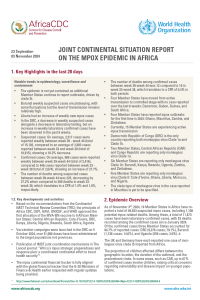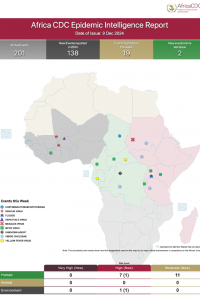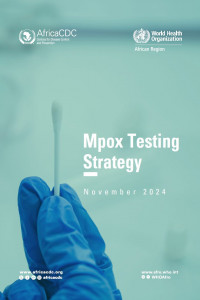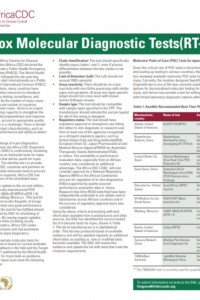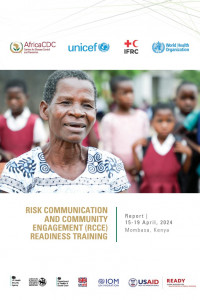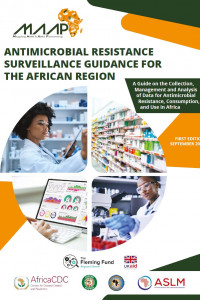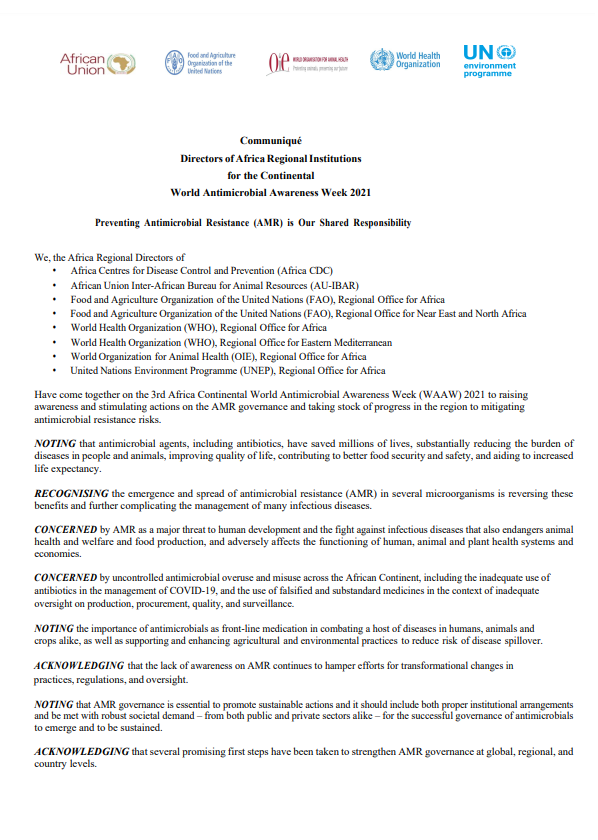
- Version
- Download 1916
- File Size 1.24 MB
- File Count 1
- Create Date 19 November 2021
- Last Updated 19 November 2021
Communiqué Directors of Africa Regional Institutions for the Continental World Antimicrobial Awareness Week 2021
Communiqué
Directors of Africa Regional Institutions for the Continental World Antimicrobial Awareness Week 2021
Preventing Antimicrobial Resistance (AMR) is Our Shared Responsibility
We, the Africa Regional Directors of
• Africa Centres for Disease Control and Prevention (Africa CDC)
• African Union Inter-African Bureau for Animal Resources (AU-IBAR)
• Food and Agriculture Organization of the United Nations (FAO), Regional Office for Africa
• Food and Agriculture Organization of the United Nations (FAO), Regional Office for Near East and North Africa
• World Health Organization (WHO), Regional Office for Africa
• World Health Organization (WHO), Regional Office for Eastern Mediterranean
• World Organization for Animal Health (OIE), Regional Office for Africa
• United Nations Environment Programme (UNEP), Regional Office for Africa
Have come together on the 3rd Africa Continental World Antimicrobial Awareness Week (WAAW) 2021 to raising awareness and stimulating actions on the AMR governance and taking stock of progress in the region to mitigating antimicrobial resistance risks.
NOTING that antimicrobial agents, including antibiotics, have saved millions of lives, substantially reducing the burden of diseases in people and animals, improving quality of life, contributing to better food security and safety, and aiding to increased life expectancy.
RECOGNISING the emergence and spread of antimicrobial resistance (AMR) in several microorganisms is reversing these benefits and further complicating the management of many infectious diseases.
CONCERNED by AMR as a major threat to human development and the fight against infectious diseases that also endangers animal health and welfare and food production, and adversely affects the functioning of human, animal and plant health systems and economies.
CONCERNED by uncontrolled antimicrobial overuse and misuse across the African Continent, including the inadequate use of antibiotics in the management of COVID-19, and the use of falsified and substandard medicines in the context of inadequate oversight on production, procurement, quality, and surveillance.
NOTING the importance of antimicrobials as front-line medication in combating a host of diseases in humans, animals and crops alike, as well as supporting and enhancing agricultural and environmental practices to reduce risk of disease spillover.
ACKNOWLEDGING that the lack of awareness on AMR continues to hamper efforts for transformational changes in practices, regulations, and oversight.
NOTING that AMR governance is essential to promote sustainable actions and it should include both proper institutional arrangements and be met with robust societal demand – from both public and private sectors alike – for the successful governance of antimicrobials to emerge and to be sustained.
ACKNOWLEDGING that several promising first steps have been taken to strengthen AMR governance at global, regional, and country levels.
UNDERSCORING the importance to adopt the holistic and multisectoral One Health’ approach to address the rising threat of AMR through integrated actions across human, animal, plant and environmental health sectors.
RECALLING existing global and continental commitments including WHO's Global Action Plan for Antimicrobial Resistance, Africa Common Position on Antimicrobial Resistance, Africa Union Framework for Antimicrobial Resistance Control, FAO's Action Plan on Antimicrobial Resistance, and OIE Strategy on Antimicrobial Resistance and the Prudent Use of Antimicrobials.
MINDFUL that tackling AMR is a Sustainable Development Agenda issue and will be critical in achieving the Sustainable Development Goals (SDGs) and improve food and nutrition security and livelihoods in Africa's largely farming-based economies and that have been made even more challenging in the context of the COVID-19 pandemic.
We, the Africa Regional Directors of the AU, FAO, OIE, WHO, and UNEP, COMMIT TO:
1. Strengthen and accelerate implementation of previous commitments to tackle AMR including relevant resolutions of the governing bodies of the African Union, the Tripartite (WHO, FAO, OIE) and UNEP, and other relevant agencies, and AMR multisectoral national action plans.
2. Advancing political leadership at regional, national, and sub-national levels to ensure successful governance of AMR by supporting robust institutional arrangements in both public and private sectors and developing and enforcing appropriate regulatory frameworks.
3. Fostering the One Health multisectoral and multidisciplinary coordination and collaboration as the best approach to leveraging our comparative mandates and strengths to effectively combat AMR.
4. Continuing to support African Member States to address the growing global threat of AMR through developing national multisectoral AMR action plans in line with the Global Plan of Action, that are urged to be fully funded, implemented and evaluated.
5. Develop and implement a comprehensive and coordinated regional advocacy and communications strategy to tackle AMR by increasing awareness, understanding, and encouraging behavior change through evidence and sharing of best practices and scientific knowledge, with engagement with academia and research institutions, private sector, civil society, and the media.
6. Maintaining and strengthening appropriate stewardship of antimicrobials, including through infection prevention and control (IPC), Water, Sanitation and Hygiene (WASH) biosecurity measures and routine immunization and advocate for equitable vaccine access to help prevent infectious diseases, including COVID-19.
7. Maintaining and strengthening good agricultural and food safety practices including safe processing, animal vaccination and farm biosecurity; farm waste management and control of infections
8. Integrating AMR in all efforts and programs for epidemic and pandemic prevention, preparedness and response, health systems strengthening, animal and environmental health, infection prevention and control, Water, Sanitation and Hygiene (WASH) and in sustainable food systems, food safety and food security.
9. Evaluating implementation of these commitments on tackling AMR through ongoing work of the existing governance mechanisms of the African Union, the Tripartite and UNEP, and sharing of lessons learned, best practices, challenges, and opportunities.
The Participants’ signatures in the spaces below record their joint acceptance and commitment for this communiqué as of 18 November 2021.
Africa Centres for Disease Control and Prevention
Dr John Nkengasong - Director of the Africa Centres for Disease Control and Prevention
African Union - InterAfrican Bureau for Animal Resource
Dr. Nick Nwankpa - Director of African Union InterAfrican Bureau for Animal Resources (AU-IBAR)
Food and Agriculture Organization of the United Nations-Regional Office for Africa
Dr. Abebe Haile-Gabriel - FAO Assistant Director-General Regional Representative for Africa
Food and Agriculture Organization of the UN - Regional Office for Near East and North Africa
Dr. AbdulHakim Elwaer - FAO Assistant DG, Regional Rep. for the Near East and North Africa
World Health Organization - Regional Office for the Eastern Mediterranean
Dr Ahmed Salim Al Mandhari - WHO Regional Director for the Eastern Mediterranean
World Health Organization-Regional Office for Africa
Dr. Matshidiso Moeti - WHO Regional Director for Africa
World Organization for Animal Health Regional Representation for Africa
Dr. Karim Tounkara - OIE Regional Representative for Africa
United Nations Environment Programme Regional Office for Africa
Dr. Juliette Biao Koudenoukpo - UNEP Regional Director for Africa
Attached Files
| File | Action |
|---|---|
| Communiqué Directors of Africa Regional Institutions for the Continental WAAW 2021 | Download |

